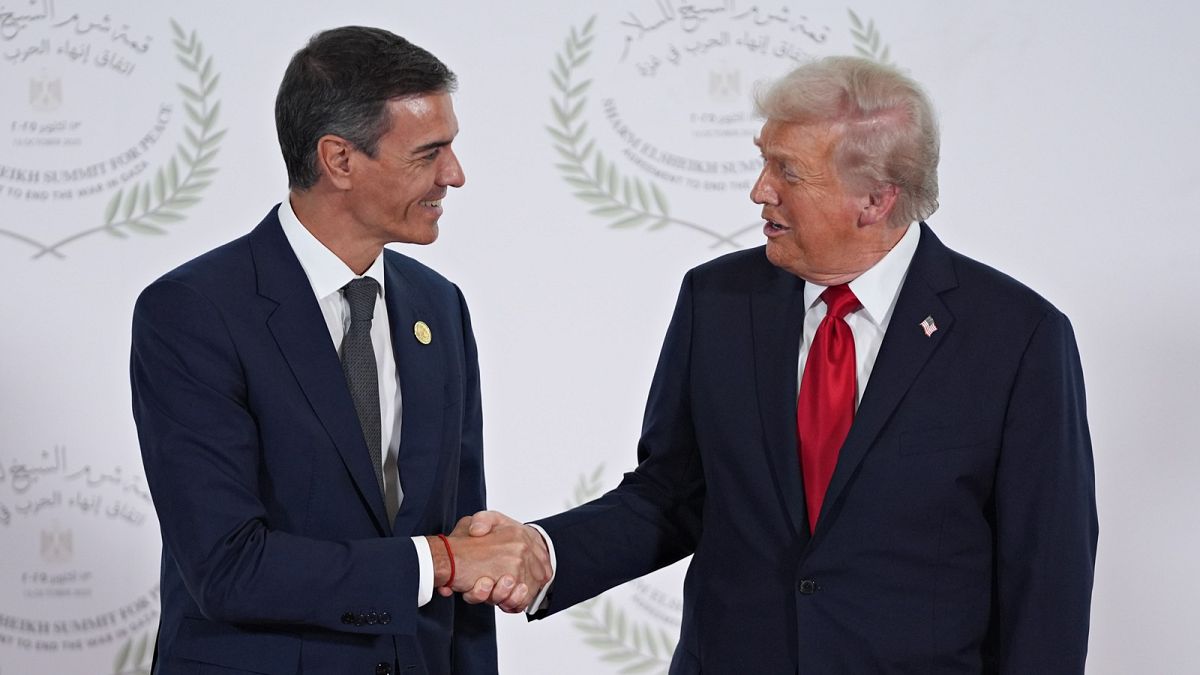Spain will be protected against any attempt by US President Donald Trump to impose punitive tariffs on the country in retaliation for its refusal to meet NATO’s 5% target, the European Commission said on Wednesday, as the dispute over defence spending further interweaves with lingering trade tensions.
All EU countries, including Spain, are bound by a common commercial policy, which means their products face the same tariffs when they are sold abroad. Technically speaking, it would be possible for the US to single out Spanish-made goods at customs and place them under a duty higher than the 15% rate currently in place.
But for Brussels, which jealously guards its exclusive competence on trade, such discrimination would be anathema.
“We will respond appropriately, as we always do, to any measures taken against one or more of our member states,” said Olof Gill, the Commission’s spokesperson for trade.
Gill did not specify which action Brussels could undertake in response to the “hypothetical” scenario. Instead, he called for dialogue to resolve any disagreement.
“We now have an EU-US trade deal in place. This is a platform for addressing any further trade-related questions,” he added.
The Commission’s assurance came a day after Trump excoriated Spain’s sluggish defence spending and raised the prospect of retribution through tariffs, an instrument that the Republican has deployed at large to advance his foreign policy goals.
“I think it’s very disrespectful to NATO. In fact, I was thinking about giving them trade punishment through tariffs because of what they did. I may do that,” Trump said, speaking to reporters in the White House.
“I think unbelievably disrespectful, Spain, the only one out of all the countries in NATO, the only (one) that said that is Spain. And I think they should be punished for that, yes.”
US vs Spain
The friction between the US and Spain dates back to the NATO summit in June, when allies met in The Hague to agree on a new common commitment to devote 5% of their GDP to defence, a number that Trump himself had pitched.
The target was broken into two parts: 3.5% on core defence spending and 1.5% on related investments, like infrastructure, civil preparedness, innovation and industry.
In the lead-up to the gathering, Spanish Prime Minister Pedro Sánchez wrote a letter to NATO Secretary General Mark Rutte calling the 5% figure “unreasonable” and “counterproductive” and asking for a tailor-made exemption for his country.
Sánchez argued that Spain, which only recently reached the previous 2% goal, could only attain the 5% mark by making painful cuts to social spending, a step that his progressive coalition government was not willing to tolerate.
The language of the final NATO declaration was adjusted to allow greater flexibility in reaching the 5% target, effectively sparing Spain from the pledge.
Since then, Trump has repeatedly bemoaned and denounced the Spanish exemption, suggesting, at one point, the nation be “thrown out”from the Atlantic alliance.
Trump met Sánchez on Monday at a peace summit in Egypt to celebrate the liberation of the Israeli hostages and the start of a ceasefire in Gaza. Both leaders shook hands and appeared to share a moment of complicity.
“Are you working here on GDP? Well, we’ll get to that,” Trump told Sánchez, who smiled back. “But you’re doing a fantastic job.”
Sánchez later told a Spanish radio that his exchange with Trump was “very cordial” and that he remained committed to both collective defence and the welfare state.
“Relations between the United States and Spain are very positive, very deep and very consolidated,” the premier said.
‘Very unhappy’
But upon his return to Washington, Trump’s tone soured, saying he was “very unhappy” with Spain for “doing very well off our backs”. The Republican linked Spain’s refusal to hike defence spending to its geographic location in southern Europe.
“Spain gets protection, and they know, you know, look, they’re sort of in the semi-middle of it, so they’re going to get protected automatically. Even if you don’t want to protect them, you are protecting them because of the way they’re located,” Trump said.
“I think what Spain did is a very bad thing for NATO. I think it’s very unfair to NATO. It wouldn’t matter if you said you’re not going to protect them because they’re pretty much protected, you know? What are you going to do? Go through the other countries, and let’s go attack Spain, right? So I think what they did is not nice.”
Asked about the comments, NATO Secretary General Mark Rutte said Trump’s leadership had been “extremely important” to enshrine the 5% objective.
“In The Hague, we had unanimity,” Rutte said on Wednesday. “Spain totally agreed to the capabilities targets. So I think that’s important to note.”
If Trump made good on his commercial threat, which is unclear at this stage, it would represent a frontal assault on the terms of the EU-US trade deal concluded in July.
Under the agreement, the vast majority of EU-made goods bound for the US market are subject to an “all-inclusive” 15% tariff, triple the previous rate, while the vast majority of US-made goods bound for the EU market are completely exempt from duties.
A select group of products, such as aircraft, critical raw materials and semiconductor equipment, benefits from a “zero-for-zero” scheme. Brussels has so far failed to convince Washington to include wines and spirits, a strategic sector for Europeans.
Additionally, the bloc has committed to spending $750 billion on American energy, investing $600 billion in the American economy and buying $40 billion worth of American AI chips by the end of Trump’s mandate. The US did not make any similar pledges.
A crucial text of the deal still needs the approval of the European Parliament, where opposition to its lopsided nature is entrenched across the political spectrum.
In the meantime, the Trump administration continues to complain about the bloc’s digital and green regulations, which Brussels insists are off the table.

